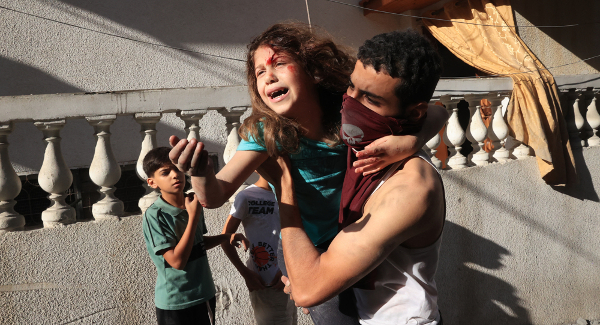image1
A man carries a rescued Palestinian girl from the rubble of a building after an Israeli airstrike at the Rafah refugee camp, in the southern Gaza Strip on October 17, 2023. (File photo by AFP)
The Israeli regime is trying to ‘deport the majority of the civilian population en masse’ as part of its plan to ‘permanently alter’ the composition of Gaza’s population, a UN expert has warned.
Paula Gaviria Betancur, the UN special rapporteur on the human rights of internally displaced persons (IDPs), said on Friday the regime has repeatedly ordered people to evacuate vast areas of the strip and indiscriminately bombarded civilians in southern Gaza
"Israel has reneged on promises of safety made to those who complied with its order to evacuate northern Gaza two months ago. Now, they have been forcibly displaced again, alongside the population of southern Gaza," she said.
"Where will the people of Gaza have left to go tomorrow?" she said.
"As evacuation orders and military operations continue to expand and civilians are subjected to relentless attacks on a daily basis, the only logical conclusion is that Israel’s military operation in Gaza aims to deport the majority of the civilian population en masse," Gaviria Betancur said.
He said the regime’s attacks have "frustrated any realistic prospects" for Gazans to return home.
"Gaza’s housing and civilian infrastructure have been razed to the ground, frustrating any realistic prospects for displaced Gazans to return home, repeating a long history of mass forced displacement of Palestinians by Israel," she said.
UN figures say around 1.9 million people, 85 percent of Gaza’s population, have been internally displaced in Gaza. The regime’s evacuation orders cover around two-thirds of the strip, limiting the civilian population to less than one-third of the region.
With the population now concentrated in small parts of southern Gaza and the health system in the region largely dysfunctional, concerns are rising about the spread of fatal diseases among the civilian population in the area.
The Israeli siege of the strip, which has extremely limited the flow of water, food, medicine and fuel to the region, has also caused starvation among the population.
UNICEF warned earlier this week more children in Gaza could die from diseases than from the Israeli bombings in the besieged Palestinian territory.
‘Attacks on hospitals unjustified’
The expert said the confinement of Gaza’s population to a tiny fraction of the strip has created an "untenable situation" for IDPs.
"Gaza has long been one of the world’s most densely populated territories. The confinement of the entire civilian population to a tiny fraction of the Gaza Strip has created an untenable situation for IDPs, particularly women, children including unaccompanied minors, older persons, and persons with serious medical conditions and disabilities," the expert said.
Betancur urged the international community, and Israel’s allies in particular, to recognize the blatant disregard for international humanitarian and human rights law that has characterized the current conflict.
"The principles of proportionality and distinction between civilians and combatants have been completely disregarded. Hospitals, schools, and shelters have been deliberately targeted without credible evidence that they are military objectives, or attacked without precautions to minimize incidental loss of life or injury to civilians," she said.
"Civilians in areas under evacuation order, as well as in so-called "safe zones", unilaterally designated by Israeli forces against international humanitarian law, have been the target of indiscriminate attacks which have killed nearly 19,000 Palestinians and injured over 51,000," the UN expert said.
’No safe place in Gaza’
"Many others have said it before - but it cannot be said enough - there is no safe place in Gaza," Gaviria Betancur said.
The expert recalled that under international law, individuals not complying with evacuation orders do not lose their right to protection. Israel has failed to honor its obligations under international law to ensure displacement does not violate the rights of those affected, Gaviria Betancur said.
"Israel’s illegal blockade and stranglehold on the entry of humanitarian aid have left IDPs living in appalling conditions," she said. "The much-needed re-opening of the Kerem Shalom border crossing will barely make a dent in the needs on the ground if more aid is not allowed in. The Secretary-General has warned that the humanitarian system in Gaza is at severe risk of collapse."
Gaviria Betancur reiterated her concerns that Israel’s actions amount to the war crimes of collective punishment and forcible transfer.
"I call on Israel to immediately end attacks on civilians, cease its campaign to alter the composition of Gaza’s population through mass forced displacement, implement a permanent ceasefire, allow for the unrestricted passage of humanitarian aid, and priorities dialogue to secure the safe release of remaining hostages," she said.
So far, the brutal Israeli attacks on Gaza have killed more than 20,000 Palestinians of which, according to the territory’s Health Ministry, more than 8,000 were children.
The Israeli regime initiated its war on Gaza on October 7 after the Palestinian Hamas resistance group carried out Operation Al-Aqsa Storm against the occupying entity in retaliation to the Zionists’ intensified atrocities against the Palestinian people.
Since the war’s start, the apartheid regime forces have been attacking Gaza towns, villages and refugee camps from the air, land and sea with bombings, shelling and direct military engagement.











